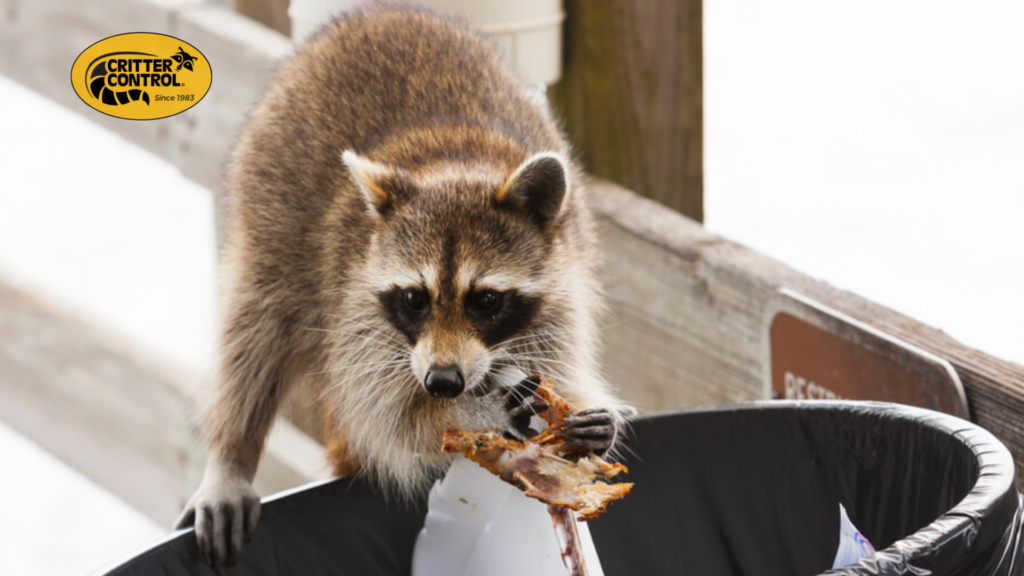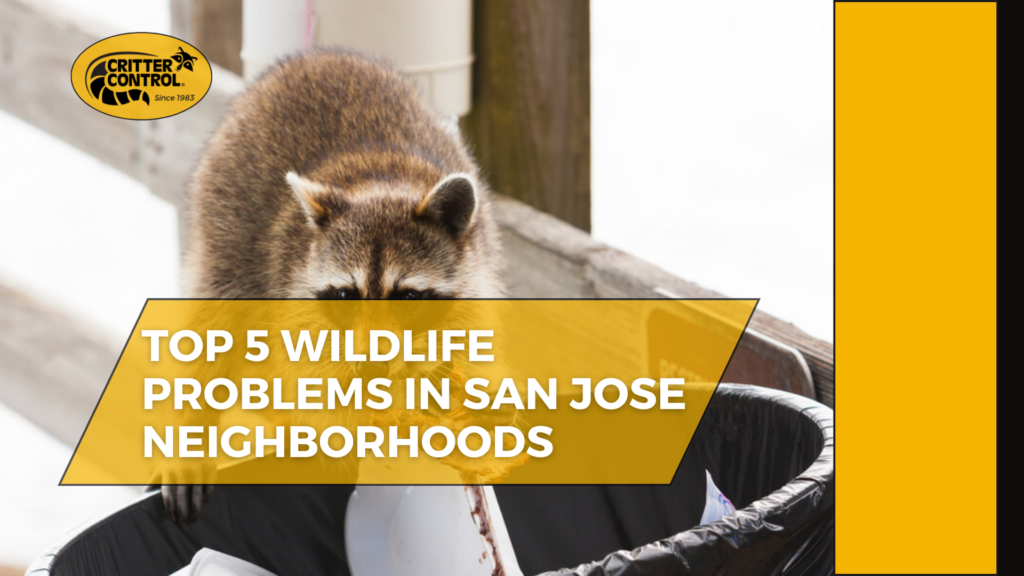San Jose is home to a diverse range of wildlife, from raccoons and skunks to squirrels and coyotes. While these animals play a vital role in the local ecosystem, they can also become a serious problem for homeowners and businesses. Wildlife intrusions can lead to property damage, health risks, and safety concerns for residents. In this article, we will explore the top five wildlife problems in San Jose neighborhoods and provide solutions for dealing with these persistent pests.
5 Wildlife Problems in San Jose Neighborhoods

1. Raccoons – Clever and Destructive Nighttime Visitors
Raccoons are highly adaptable creatures that thrive in urban and suburban areas. Known for their intelligence and dexterity, these nocturnal animals can quickly become a nuisance in San Jose neighborhoods.
Common Problems Caused by Raccoons
- Raiding Trash Bins: Raccoons are notorious for scavenging through garbage, leaving behind a mess and attracting other pests.
- Damaging Roofs and Attics: Raccoons often seek shelter in attics, tearing apart shingles, vents, and insulation to gain entry.
- Spreading Diseases: These animals carry parasites and diseases such as rabies and leptospirosis, which can pose risks to humans and pets.
How to Prevent Raccoon Infestations
- Secure trash bins with heavy-duty lids or locking mechanisms.
- Trim tree branches near your roof to prevent easy access.
- Seal off entry points such as vents, chimneys, and gaps in roofing.
- Use motion-activated lights or sprinklers to deter raccoons from your property.
If raccoons have already taken up residence in your attic or yard, professional wildlife removal services may be necessary to safely relocate them.
2. Skunks – Unwelcome Guests with a Potent Defense
Skunks are another common wildlife problem in San Jose, best known for their foul-smelling spray. While they generally avoid human interaction, they can become aggressive when threatened and may take up residence under decks, porches, and sheds.
Signs of a Skunk Problem
- Strong, lingering odor around your property, especially at night.
- Holes in your lawn as skunks dig for grubs and insects.
- Skunk sightings near crawl spaces, garages, or garden beds.
How to Keep Skunks Away
- Eliminate food sources such as pet food left outside, fallen fruit, and compost piles.
- Secure outdoor structures by installing barriers around decks and sheds.
- Use skunk repellents like ammonia-soaked rags, predator urine, or citrus peels.
- Keep your yard well-lit, as skunks prefer dark areas for shelter.
Trapping and relocating skunks on your own can be risky due to their defensive spray. If a skunk has settled on your property, it is best to call a wildlife control San Jose, CA
3. Squirrels – Small but Destructive Pests
Squirrels may appear harmless, but their constant gnawing and nesting habits can lead to significant damage to homes and gardens. In San Jose, tree squirrels are especially problematic, as they frequently invade attics and chew on electrical wiring.
Common Issues Caused by Squirrels
- Roof and attic damage: Squirrels can chew through vents, soffits, and eaves to create entry points.
- Chewed electrical wires: This can pose a fire hazard in homes and buildings.
- Garden destruction: Squirrels dig up bulbs, steal birdseed, and chew on plants.
Effective Squirrel Prevention Tips
- Install chimney caps and cover vents with metal mesh to block entry points.
- Use squirrel-proof bird feeders to prevent them from raiding food sources.
- Trim tree branches near your house to prevent easy roof access.
- Apply taste deterrents to outdoor wires and garden plants.
Once squirrels establish a nest in your attic, squirrel removal services may be needed to relocate them safely and seal entry points.
4. Coyotes – A Growing Concern for Pet Owners
Coyotes have become more common in urban and suburban areas of San Jose due to habitat loss and increased food availability. While they typically avoid humans, they can pose a serious threat to small pets and livestock.
Dangers Posed by Coyotes
- Pet attacks: Coyotes are known to prey on cats and small dogs left unattended in yards.
- Livestock predation: Chickens, rabbits, and other small farm animals are frequent targets.
- Aggressive behavior: While rare, coyotes may act aggressively if they become too comfortable around humans.
How to Protect Your Property from Coyotes
- Do not leave pet food outside, as it can attract coyotes and other wildlife.
- Secure fences: Install fences at least 6 feet high with an overhang to prevent coyotes from jumping over.
- Use motion-activated deterrents, such as lights and sprinklers, to scare off coyotes.
- Supervise pets when they are outside, especially during dawn and dusk when coyotes are most active.
Coyotes play an important role in the ecosystem, but if they become too bold around homes, professional wildlife management may be needed to deter them safely.
5. Rats – Disease-Carrying Rodents That Invade Homes
Rats are one of the most serious wildlife problems in San Jose neighborhoods. These rodents are known for spreading diseases, contaminating food, and causing extensive property damage by gnawing on wires, insulation, and wood.
Signs of a Rat Infestation
- Droppings in cupboards, along walls, or near food sources.
- Gnaw marks on furniture, wires, and food packaging.
- Scurrying noises in walls and ceilings, especially at night.
- Grease marks along walls and baseboards from rat fur.
How to Get Rid of Rats
- Seal entry points such as cracks, vents, and holes in walls.
- Store food in airtight containers and clean up spills immediately.
- Use traps and bait stations to control the rat population.
- Hire a professional exterminator if the infestation is severe.
Rats reproduce quickly, so it is crucial to take action at the first sign of an infestation to prevent it from escalating.
FAQs About Wildlife Problems in San Jose
1. What should I do if I find a wild animal in my attic?
If you discover a raccoon, squirrel, or other wildlife in your attic, avoid direct contact and call a professional wildlife removal service to handle the situation safely.
2. Are skunks dangerous to humans?
Skunks are not aggressive but can spray a strong, foul-smelling liquid when threatened. They may also carry rabies, so it is best to keep your distance.
3. How can I keep raccoons out of my trash cans?
Use raccoon-proof trash cans with locking lids and avoid leaving garbage outside overnight.
4. Can I remove wildlife from my property on my own?
In many cases, it is illegal or unsafe to trap and relocate wildlife without proper permits. Professional wildlife control services have the expertise to handle removals humanely.
5. What is the best way to keep coyotes away from my yard?
Supervise pets, secure trash bins, and install tall fences with overhangs to keep coyotes from entering your yard.
San Jose neighborhoods face numerous wildlife challenges, but with proactive prevention and professional help, residents can protect their homes and communities from these pests. If you are dealing with a persistent wildlife issue, consider reaching out to an experienced wildlife control service for assistance.




